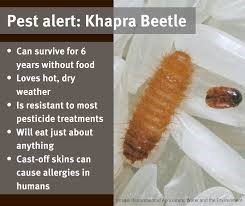The Department of Agriculture, Water and Environment (DAWE) has advised that containers from 40 listed countries in Europe, Asia, the Middle East and Africa will need to be treated either using methyl bromide, heat treatment or pesticides, and to be issued with a valid certificate before leaving the port of export, from 12 July.
The system now being implemented by Australian authorities will act as a pilot project in developing systems to prevent the spread of many other invasive species that have been identified.
Khapra beetles can devastate indigenous crops and economies if they get a foothold in a country and the new measures have been designed to prevent that migration from taking place here in Australia.
On Monday this week, DAWE issued notice IAN 151-2021, titled: Sea container measures to protect against khapra beetle. It follows last week’s notice 145-2021, advising that additional measures under Phase 6A of the khapra beetle urgent actions would commence on 12 July 2021. These additional measures will introduce mandatory offshore treatment requirements for all FCL sea containers packed with all types of goods in a target risk country and unpacked in a rural grain growing area of Australia.
Importer declaration
In some instances, DAWE may seek an importer declaration to verify the unpack location of the sea container. Such a declaration could be requested in instances where the delivery address indicates a rural grain growing area, but nil khapra concerns have been identified by a customs broker, or where import declarations are amended to a metropolitan or rural non-grain growing area.Â
Treatment non-compliances
Since the introduction of Phase 6A (1) measures, the vast majority of container treatments have been conducted as methyl bromide fumigations. Consignments for which container treatment was completed on or after 01 August 2021 and deemed to be non-compliant or ineffective by DAWE, will not be eligible for onshore risk mitigation measures and will be directed for export, unless the sea container meets the in-transit policy criteria.
To minimise the risk of khapra beetle entering Australia, and to avoid the risk of non-compliant consignments being directed for export, DAWE strongly encourages importers to ensure imported consignments subject to the khapra measures comply with their treatment methodologies.
For further information, talk to us here at Colless Young. As licensed Customs Brokers and International Freight Forwarders, we offer correct, professional advice on all your import and export cargo shipping needs. We are based in Brisbane and provide a complete range of logistics services, for both air and sea freight, including fumigation, warehousing and trucking – through all Australian ports and airports.


